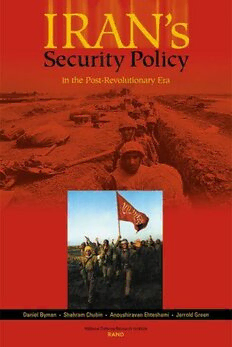
Iran's Security Policy in the Post-Revolutionary Era PDF
123 Pages·2001·0.582 MB·English
Most books are stored in the elastic cloud where traffic is expensive. For this reason, we have a limit on daily download.
Preview Iran's Security Policy in the Post-Revolutionary Era
Description:
Religion, nationalism, ethnicity, economics, and geopolitics all are important in explaining Iran's goals and tactics in its relation-ship with the outside world, as are the agendas of key security institutions and the ambitions of their leaders. This report assesses Iran's security policy in light of these factors. It examines broad drivers of Iran's security policy, describes important security institutions, explores decisionmaking, and reviews Iran's relations with key countries. The authors conclude that Iraq is widely recognized as the leading threat to Iran's Islamic regime and Afghanistan is seen as an emerging threat. In contrast, Iran has solid, if not necessarily warm, relations with Syria and established working ties to Pakistan and Russia. Iran's policies toward its neighbors are increasingly prudent: It is trying to calm regional tension and end its isolation, although its policies toward Israel and the United States are often an exception to this policy.
See more
The list of books you might like
Most books are stored in the elastic cloud where traffic is expensive. For this reason, we have a limit on daily download.
